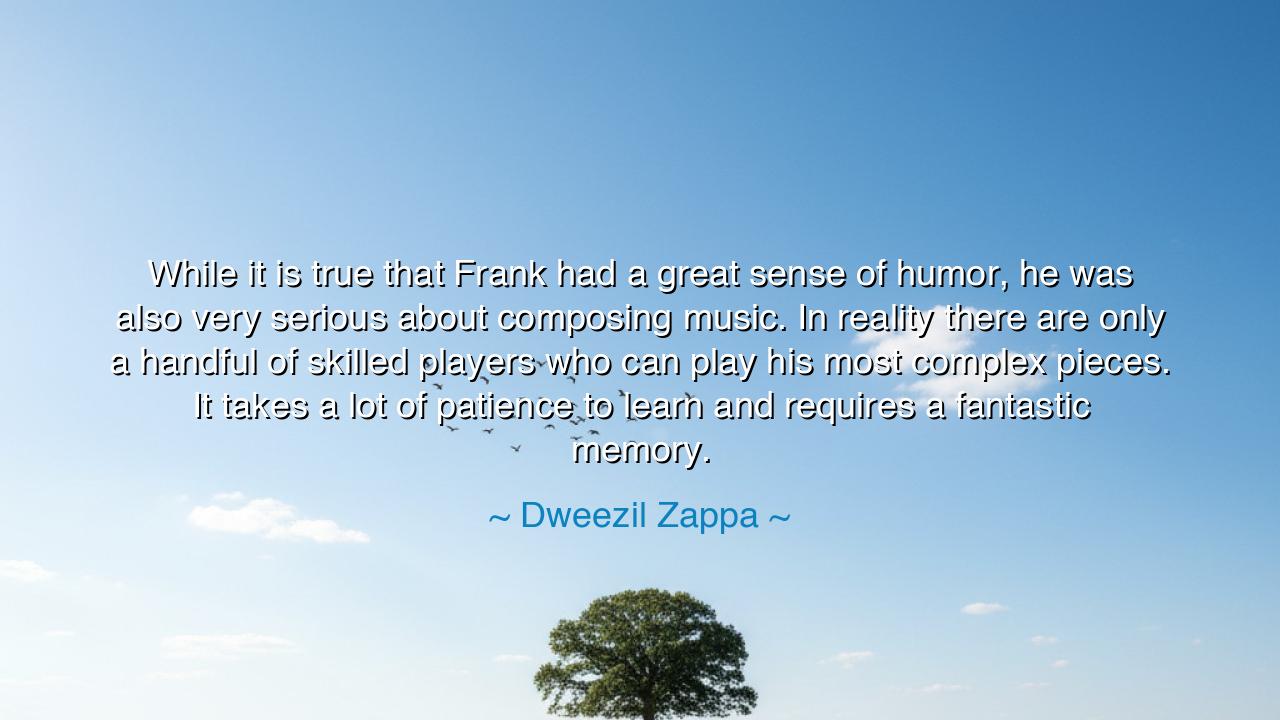
While it is true that Frank had a great sense of humor, he was
While it is true that Frank had a great sense of humor, he was also very serious about composing music. In reality there are only a handful of skilled players who can play his most complex pieces. It takes a lot of patience to learn and requires a fantastic memory.






The musician Dweezil Zappa, son of the legendary composer Frank Zappa, once said: “While it is true that Frank had a great sense of humor, he was also very serious about composing music. In reality there are only a handful of skilled players who can play his most complex pieces. It takes a lot of patience to learn and requires a fantastic memory.” In these words lies not just a tribute to a father’s genius, but a profound reflection on the sacred balance between humor and mastery, between playfulness and discipline. Dweezil’s statement unveils a universal truth: that true creativity is not born of chaos, but from a harmonious marriage between the spirit of joy and the rigor of labor.
Frank Zappa, though often remembered for his wit, eccentricity, and irreverence, was also a musical architect of astonishing precision. Beneath the laughter and satire lay the mind of a scholar — one who studied form, sound, and complexity with unrelenting seriousness. Dweezil’s observation reminds us that the sense of humor that colored his father’s work did not weaken its intellectual or emotional depth; it enhanced it. Humor, in Zappa’s art, was not an escape from seriousness but a companion to it — a sign of vision broad enough to contain both laughter and discipline, both rebellion and order.
The phrase “only a handful of skilled players can play his most complex pieces” speaks to the awe-inspiring technical mastery Frank Zappa demanded of his musicians. His compositions often combined rock, jazz, classical, and avant-garde forms into a symphonic chaos that only the most patient and gifted could navigate. To play his music was to wrestle with rhythm, to dance with time itself. Like the great composers of old — Bach, Stravinsky, Bartók — Zappa created works that required not only talent but endurance, intellect, and devotion. His humor might have made audiences laugh, but his music made musicians tremble with challenge.
This blend of humor and discipline has ancient echoes. In the workshops of Leonardo da Vinci, laughter and art coexisted like twin flames. Leonardo, known for his whimsical sketches and riddles, was also the embodiment of patience — spending years perfecting a single invention, a single smile. Likewise, Michelangelo, who joked about his own exhaustion while carving the Pietà, also endured endless pain to bring marble to life. These masters understood what Frank Zappa lived: that humor is not the opposite of seriousness, but the breath that sustains it. It keeps the spirit light, so the body may endure the weight of creation.
When Dweezil speaks of the need for “patience” and a “fantastic memory,” he reveals the hidden foundation of all greatness. Every act of creation — whether in art, science, or life — demands the slow, painstaking cultivation of the mind. Patience is the soil in which genius grows. Memory, meanwhile, is the thread that binds the fragments of learning into a tapestry of mastery. To perform Zappa’s music is not merely to play notes; it is to enter into the labyrinth of his thought, where each rhythm and phrase must be recalled, balanced, and interpreted anew. Thus, Dweezil’s words become not only a reflection on his father’s legacy but a lesson for all who seek to create with meaning: that greatness is never accidental — it is earned through endurance.
The lesson in Dweezil Zappa’s reflection is clear: never mistake lightness of spirit for lack of depth. Humor, when paired with discipline, becomes a source of strength; laughter, when rooted in purpose, becomes divine. To live well is to live as Frank Zappa composed — with courage to be unconventional, with patience to refine one’s craft, and with humor to survive the burden of ambition. The road to mastery may be long and lonely, but laughter along the way makes the journey not only bearable, but beautiful.
So, my friends, remember this: the highest art is born from balance — between joy and struggle, freedom and control, jest and seriousness. Work with patience, play with courage, and never let the weight of your dreams silence your laughter. For as Dweezil reminds us through his father’s example, genius does not come from choosing between humor and discipline — it comes from embracing both, and letting them sing together in harmony.






AAdministratorAdministrator
Welcome, honored guests. Please leave a comment, we will respond soon